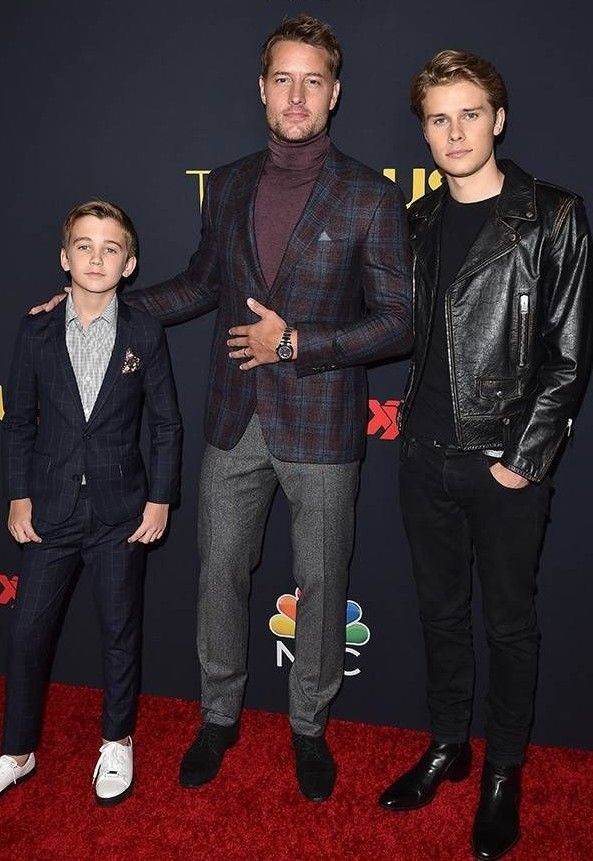
Actor Justin Hartley says his show “Tracker” is successful because the lead character that he plays in the series is comfortable with his masculinity. “One of the things I really love about Colter and the way we’ve built him is that he doesn’t apologize for his masculinity,” Hartley said in an interview with Men’s Journal published on June 5. “I think that’s what people are looking for,” the actor said. “You’re asking yourself, ‘What kind of people do I want to hang out with?’ And particularly: ‘What kind of male friends do I have in my life that I really value?’ I think we’ve crafted a character that is so emotionally evolved, and he really does want to get to the root of why people do things.” The show is currently in its second season with a third season reportedly in the works.
The specific reason Hartley thinks his character has resonated so much is because of how Shaw balances his masculinity. “He’s a man through and through,” Hartley said. “And that doesn’t mean you have to be the loudest person in the room and know every single f—–g thing and throw tables around and scream and shout and yell and smoke and drink. He’s all about talking with people. Reading people. Understanding them. He’s an all-encompassing man. He’s not just a guy. He’s a man.” Also playing into the success of the show is the work the team has put into the character’s development.
“The facts are that [executive producer] Ken Olin and I set out to do a show that was in fact a throwback,” Hartley said. “We wanted a new spin on a procedural, meaning our character would evolve over time. He would not just remain the same exact person every single week. We were hopeful people would like it. People ended up loving it. I think there’s a huge appetite for this kind of show.” Hartley is well-known for his role in the CBS series, as well as other hit series, including the NBC drama “This Is Us,” “Passions,” “Smallville,” and “The Young and the Restless.”
When it comes to TV shows that strike a chord with audiences, there’s often a secret sauce behind their success. For Justin Hartley’s new hit show, Tracker, that secret is clear: it embraces masculinity in a way that’s raw, unapologetic, and refreshing. In an era where the definition of masculinity is often debated and scrutinized, Tracker boldly leans into traditional male traits without shame or apology—and viewers are eating it up.
Let’s dive into why Tracker is resonating so deeply, what Justin Hartley means by “not apologizing for masculinity,” and how this approach is shaping a fresh narrative in today’s TV landscape.
What Makes ‘Tracker’ Stand Out in a Sea of TV Shows?
There are hundreds of shows out there fighting for attention. But Tracker cuts through the noise by offering something simple yet powerful: a masculine hero who is confident, complex, and unapologetically himself.
Masculinity Reimagined
Instead of watering down masculine traits or painting them as toxic, Tracker celebrates strength, loyalty, and emotional honesty as complementary—not contradictory—qualities. It doesn’t hide behind clichés or stereotypes but portrays a multi-dimensional man navigating modern challenges head-on.
Justin Hartley’s Take on Masculinity in ‘Tracker’
Justin Hartley, who stars in and produces Tracker, has openly talked about why the show’s masculinity feels authentic. He says it’s about owning who you are and not apologizing for it—whether that’s being tough, vulnerable, or protective.
Owning Your Identity Without Shame
Hartley believes many shows today try to soften masculinity or present it as a flaw. Tracker pushes back on that by showing a protagonist who is strong but also sensitive and principled. It’s the kind of masculinity that resonates because it feels real and relatable.
Why Audiences Crave This Kind of Masculinity Now
In recent years, conversations about gender have often cast masculinity in a negative light. But that’s created a craving for media that portrays men as whole people—flaws, strengths, and all.
Filling a Cultural Gap
Tracker taps into this hunger by offering a masculine hero who isn’t a caricature or a villain but a nuanced human being. This makes the show more engaging and meaningful for viewers tired of one-dimensional portrayals.
How ‘Tracker’ Balances Masculine Strength with Emotional Depth
One of the biggest misconceptions about masculinity is that showing emotion is weak. Tracker flips that idea on its head by weaving emotional depth right into the hero’s journey.
Strength Isn’t Just Physical
In Tracker, strength means standing up for what’s right, protecting loved ones, and being willing to confront inner fears. This blend of toughness and vulnerability creates a compelling and believable character.
The Role of Masculinity in Modern Storytelling
Storytelling is evolving, and so is the way masculinity is portrayed on screen. Tracker is part of a new wave of shows that reject tired stereotypes and instead embrace complexity.
Breaking Old Tropes
Gone are the days of the stoic, unfeeling male lead. Today’s audiences want characters they can connect with—heroes who show real emotion, struggle, and growth. Tracker delivers exactly that.
Justin Hartley’s Journey to ‘Tracker’: A Personal Mission
Hartley’s commitment to authentic masculinity isn’t just professional; it’s deeply personal. He’s shared that playing the lead in Tracker aligns with his values and how he views manhood.
Putting Heart Behind the Hero
By infusing his own experiences and beliefs into the role, Hartley helps bring a level of sincerity to the show that audiences can sense and appreciate.
What Viewers Are Saying About ‘Tracker’
The response to Tracker has been overwhelmingly positive, especially among those craving strong, masculine role models portrayed with honesty.
Fans Praise the Show’s Boldness
Social media is buzzing with praise for the show’s unique take on masculinity—fans appreciate the lack of apology and the complexity of the lead character.
How ‘Tracker’ Influences the Broader TV Industry
The success of Tracker is sending a message to Hollywood: audiences want masculinity that’s unapologetic but real.
A Shift in Casting and Writing
Expect to see more shows and movies inspired by Tracker’s approach, with male leads who aren’t afraid to show strength and sensitivity side-by-side.
Masculinity Without Apology: What Does It Really Mean?
Justin Hartley’s phrase “doesn’t apologize for his masculinity” is more than just a catchy line. It’s a mindset.
Confidence in Authenticity
It means embracing who you are—strengths, flaws, and all—and not feeling pressured to conform to others’ expectations or cultural shifts that undermine your identity.
Can ‘Tracker’ Appeal to Both Men and Women?
Absolutely. The show’s honest portrayal of masculinity doesn’t alienate female viewers; instead, it offers a fresh perspective that’s appreciated across genders.
Universal Themes of Honor and Integrity
At its core, Tracker tells a story about integrity, courage, and loyalty—values that resonate universally, regardless of gender.
The Psychology Behind Why Masculinity Matters in Media
Masculinity isn’t just a buzzword—it’s tied to identity, confidence, and mental health for many men.
Media’s Role in Shaping Self-Perception
Shows like Tracker help normalize healthy masculine traits, giving viewers positive role models to relate to.
Comparing ‘Tracker’ to Other Masculine-Centric Shows
While other shows have tried to portray masculinity, Tracker stands apart with its balance of toughness and emotional honesty.
A Fresh Take in a Crowded Genre
Where many shows fall into the trap of macho bravado or toxic clichés, Tracker crafts a nuanced, relatable lead.
How ‘Tracker’ Tackles Toxic Masculinity vs. Healthy Masculinity
Tracker doesn’t ignore the issue of toxic masculinity—it challenges it by showcasing what healthy masculinity looks like.
Setting a New Standard
The show illustrates that being a “real man” involves respect, empathy, and strength combined, not dominance or suppression of feelings.

The Impact of ‘Tracker’ on Young Male Viewers
For younger audiences, seeing a strong but emotionally aware male lead can be transformative.
Role Models Matter
Tracker provides a blueprint for young men on how to embrace masculinity without fear or guilt.
Justin Hartley’s Vision for the Future of ‘Tracker’
Hartley sees Tracker as more than entertainment; it’s a conversation starter about masculinity in modern culture.
Expanding the Story
Future seasons promise to deepen the exploration of masculinity, relationships, and personal growth.
Conclusion: Why ‘Tracker’ Is a Game-Changer in Portraying Masculinity
Justin Hartley’s Tracker is successful because it taps into a universal desire: to see masculinity represented authentically and without apology. The show challenges outdated stereotypes, embraces emotional complexity, and offers viewers a hero who is both strong and real. As audiences continue to seek relatable stories and characters, Tracker stands tall—unapologetically masculine, undeniably engaging, and undeniably human.